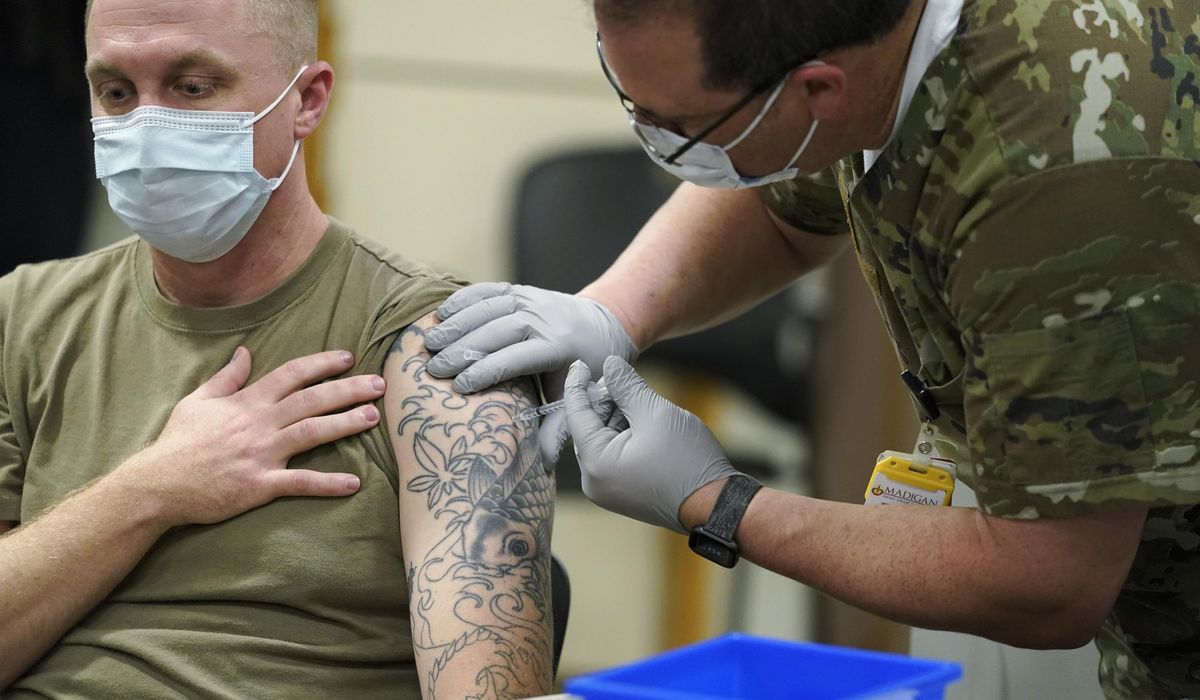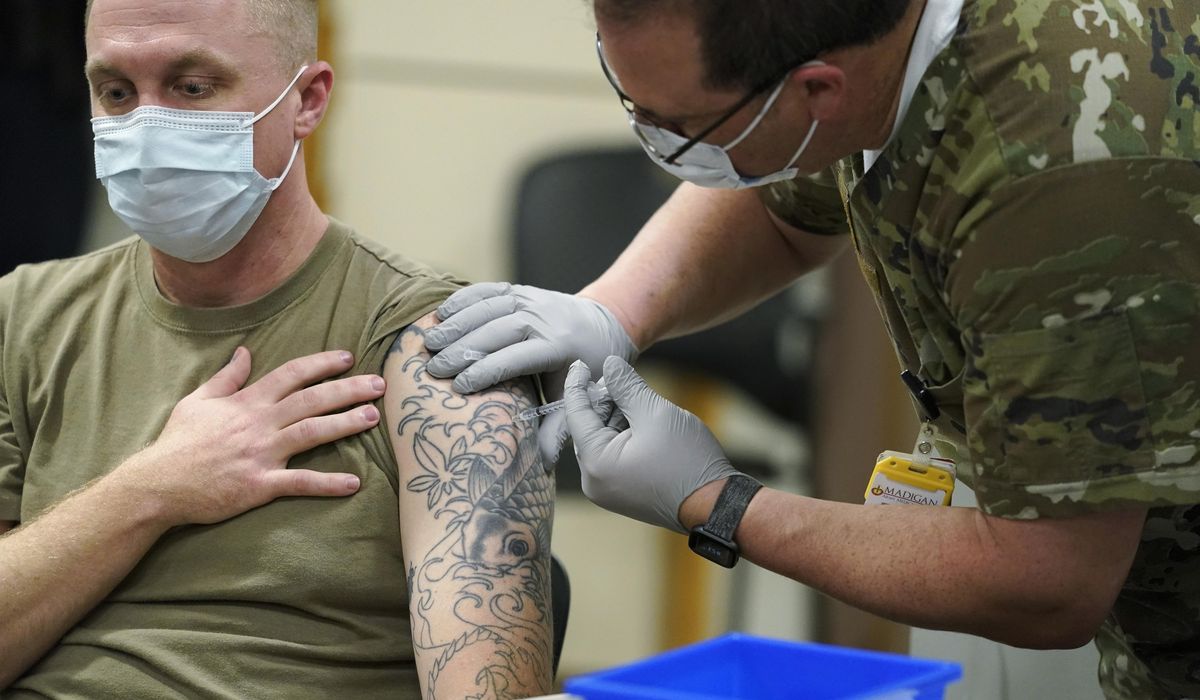
They didn’t make the decision lightly, as they were fully aware it would likely cost them their military careers. But for U.S. troops who refused the federally mandated COVID-19 vaccine, it was a sacrifice worth making.
Washington Times interviews with several service members and the lawyers who represent them revealed a host of reasons for opting against coronavirus immunization. They include deeply held religious beliefs, fears of long-term health side effects and broader concerns about what objectors say is the increasingly heavy hand of government in their personal lives.
In each case, the troops explained how they consulted with their family, friends, colleagues, legal counsel and other stakeholders as they weighed their options. Each said they understood early on, from the moment Defense Secretary Lloyd Austin last year ordered all military personnel to get vaccinated, that their choice would come with serious repercussions, likely including removal from their units and subsequent losses of health and retirement benefits.
Pentagon officials insist the vaccine mandate is needed to maintain the safety and readiness of the American fighting force. They stress that the vaccines are medically safe.
With relatively few exceptions, the Pentagon has routinely ruled that spiritual belief isn’t a valid reason to be excused from vaccination.
Thousands of troops believe otherwise. Whether one agrees with their decision or not, there is little doubt it comes from a place of deep conviction.
“What’s going on right now is unjust,” one active-duty Navy SEAL told The Times in a recent interview. The Times is not identifying the resisters by name because they have filed formal religious waiver requests with the Navy and haven’t received final decisions.
“As service members in the military, we understand we swore an oath to the Constitution,” they said. “Your allegiance … is to the law of the land, which is the Constitution.”
“Ultimately, we would be … hypocritical, or we would be frauds, to go against the oath we swore in defending the law of the land if we were to comply with tyranny or to comply with something that is built off of lies,” the SEAL said.
Behind the scenes, SEALs described an atmosphere of pressure and coercion from the early days of the Pentagon’s vaccine mandate. When they raised questions about the vaccines, they said they were essentially told they needed to get them “because it’s an order.” Lawyers representing service members said they had clients who ultimately decided to get the shot, despite their doubts, simply because of the pressure from peers and commanding officers.
The Defense Department strongly denies such charges. Defense officials say military personnel are given every opportunity to have their questions answered and concerns addressed when it comes to vaccinations and other health-related matters.
An unprecedented fight
Navy SEALs across the country have found themselves at the center of the vaccine fight. Last week, attorneys for 35 Navy SEALs and other special warfare personnel who object to the mandate on religious grounds asked the Supreme Court to intervene on their behalf and block any punishment for refusing the shot.
A week earlier, the Biden administration asked the high court to lift an earlier injunction keeping the Navy from considering vaccination status when deploying service members. None of the SEALs interviewed by The Times for this article is involved with that case, which is making its way through federal court in Texas.
That case centers on religious objections, but other factors are at play.
Another SEAL, who also asked to not be identified, discussed how they continue to face punishment even as many vaccine mandates, mask requirements and other COVID-19 policies are quickly rolled back across American society. Some of those policies are still being contested in court, but the outcome could result in a world in which unvaccinated civilians are working alongside troops who have been forced to get the vaccine, raising questions about the effectiveness and fundamental fairness of the policy.
“When we approach a topic of fairness, we understand that life is not fair,” the SEAL said. “Period. We approach it from right and wrong, and that leads us back to what the word of God says. If it is wrong, then we are going to stand in opposition to that. It may not be fair, but we’re looking to stand in truth.”
R. Davis Younts, a Pennsylvania lawyer representing about 60 military members, including the SEALs interviewed by The Times, said many of his clients have religious objections to vaccines because of research connected to the origins of the vaccines that was conducted using fetal stem cells. Numerous service members also cited that as a key reason for their objection.
Mr. Younts acknowledged that his clients, and all other service members, need to receive more than a dozen other vaccinations before they are allowed into the military. That has given fuel to critics who say the COVID-19 vaccine refusals are based more on politics than spirituality and moral beliefs.
“Why this vaccine? Military members get anywhere from 15 to 17 mandatory vaccines. I’ve had them,” said Mr. Younts, who spent more than a decade as an active-duty service member in the Air Force and served as a military attorney.
“All up until this vaccine, this is the first time there’s been a vaccine with a known tie with fetal cell tissue development,” he said. “That’s a huge issue for me. That’s a huge issue for my clients.”
Mr. Younts, along with other attorneys involved in COVID-19 vaccination cases, have argued that the military’s system of processing the thousands of religious waiver requests simply isn’t up to par. They say the system has been stretched thin and is struggling to handle the number of waivers filed. Some military officials have privately acknowledged that claim in past conversations with The Times.
“They don’t have the resources to handle this in a serious manner,” said Sean Timmons, a Houston lawyer whose firm, Tully Rinckey PLLC, represents more than 100 military personnel seeking COVID-19 exemptions.
“It’s a giant mess,” Mr. Timmons told The Times in November. “Nobody knows what’s going on. It’s been a complete and utter disaster every step of the way.”
Indeed, one SEAL told The Times, that they are “in complete limbo” with little clarity on when they will get a final decision on their waiver requests and whether they will be kicked out of the military.
Pentagon officials vehemently deny accusations that they are rushing through the process and issuing mass denials without proper consideration for each individual case. They say they are processing the cases fairly and as quickly as possible.
“All religious accommodation requests and appeals are reviewed and adjudicated on a case-by-case basis. Each request receives full and thorough consideration of the facts and circumstances presented by the service member,” a Navy spokesperson told The Times. “We do want to reiterate that the secretary and chief of naval operations’ top priority is protecting the health of service members. The health and readiness of our service members is of paramount importance to maintaining war-fighting readiness.”
The ‘worst possible outcome’
Navy officials stressed that service members have numerous forums where they can get answers to their questions about the coronavirus immunizations, including a host of information about any potential medical side effects.
Service members describe a much different environment behind the scenes.
“Just our normal baseline questions — they were not answered, and they’re still not answered,” one SEAL said.
Across the services, just a handful of religious waivers have been approved. In some cases, service members claim to have suffered punishment just for informing their commanders that they intended to file a waiver request.
Air Force Reserve officer Lt. Col. Brandi King said she met with superior officers in September and said she intended to file a waiver request.
“I just had this overwhelming feeling that I was not under any circumstance supposed to put whatever this is into my body,” she told The Times. “I just was adamant I was not to put this in my body at all costs, even if it means I was living under a bridge in a cardboard box with my kids.”
Col. King said her orders were canceled even before she formally submitted the request. She said she is now being shifted from her job into the Individual Ready Reserve. She said the move essentially amounts to being fired from her position.
Col. King said she filed numerous waiver requests, including several on medical grounds, after learning she was allergic to some ingredients in COVID-19 vaccines. None has been approved.
“I don’t say this lightly …,” said Mr. Younts, who represents Col. King. “In my capacity as her attorney, there was no logical or reasonable justification for being fired from this position … other than she was going to submit a religious waiver request.”
Air Force officials deny those claims. An Air Force spokesperson told The Times that the service “didn’t cancel any orders based on religious accommodation requests.”
“All requests for a COVID-19 vaccine exemption are reviewed thoroughly on a case-by-case basis so each is given full and fair consideration. Service members’ requests are evaluated to see if their accommodation can be supported with no impact to mission readiness,” an Air Force spokesperson said. “The Department of the Air Force has approved for the total force 21 religious accommodations and two religious accommodation appeals that meet that criteria.”
The Army has approved one religious waiver request, with thousands more to be processed. The Navy has approved none for its active-duty service members, the most recent figures show. The Marine Corps has approved six religious waiver requests. Each service has approved additional waivers on medical or administrative grounds.
The military is sorting through thousands more appeals from service members whose initial requests were denied. As that process plays out, the SEALs interviewed by The Times said they are anxiously awaiting their fates.
“We all were advised by more wise people than ourselves to count the costs before we started this … and what could the repercussions be of this action,” one of the SEALs said, adding that they have braced themselves for the “worst possible outcome.”
• Mark A. Kellner contributed to this report
For more information, visit The Washington Times COVID-19 resource page.








